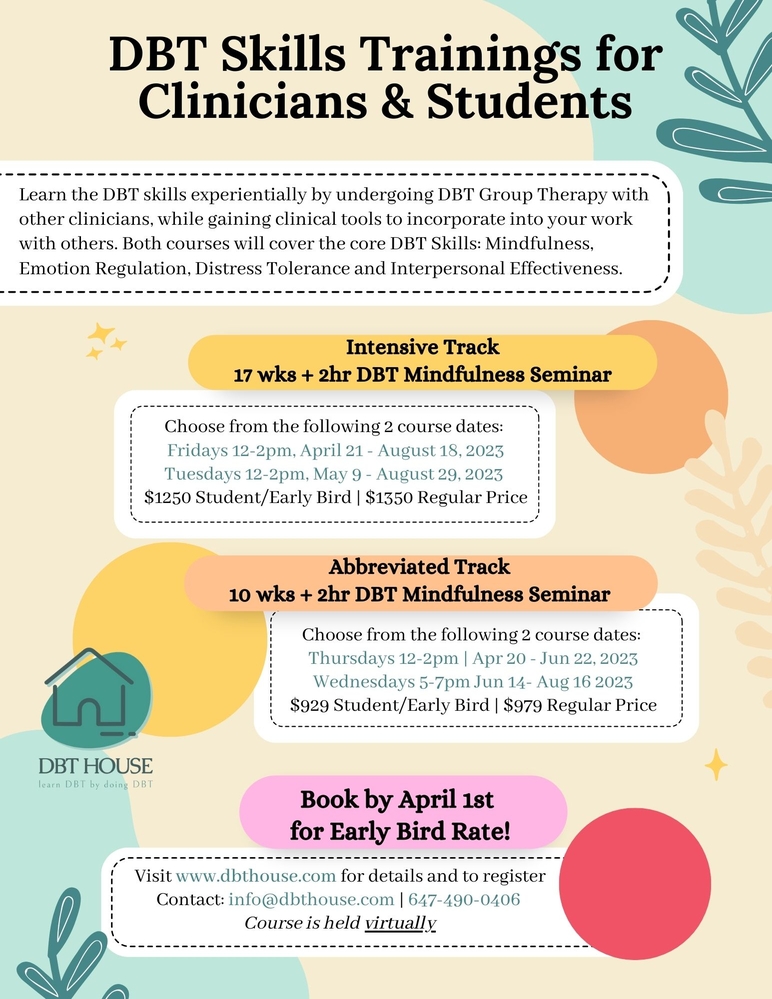DBT HOUSE is offering another round of virtual Dialectical Behaviour Therapy (DBT) Skills Training to mental health clinicians and students who wish to learn experientially by undergoing DBT Group Therapy. Participants will gain clinical tools to assist in incorporating the DBT skills into your work with others.
The training will cover the core DBT skills of Mindfulness, Emotion Regulation, Distress Tolerance and Interpersonal Effectiveness outlined in the DBT Skills Handouts and Worksheets: Second Edition by Marsha M. Linehan.
DBT offers skills that assist with labelling and managing emotions; tolerating distress and accepting reality; increasing mindful awareness; and communicating needs to others.
Abbreviated DBT Skills Training
11 sessions (22 hrs)
Meets Virtually on Thursdays 12-2pm
Apr 20 - Jun 22, 2023
*Includes 2hr DBT Orientation & Mindfulness Seminar:
Sun. April 16 OR May 28, 5-7pm ET
$929 - Student/ Early Bird - book by April 1st!
$979 - Regular Price
Ontario and Alberta residents may submit cost of sessions to their insurance provider for reimbursement.
Student and group rates provided. Payment plans are available upon request.
*Limited spots available* Max. group size is 10 participants.
Participants may join from any location.
Visit www.dbthouse.com for more information and Register Here
Contact info@dbthouse.com or call 647-490-0406 for inquiries.
Not sure if you want to commit the time? Attend our 2-hr DBT Info Session & Mindfulness Seminar to check out what DBT is all about!
What is DBT?
DBT is a skills-based therapy where the general goal is to "learn how to change your own behaviours, emotions, and thoughts that are linked to problems in living" (Linehan, M., 2015). DBT sets out to solve these problems in living by providing a set of acceptance and change-based skills aimed at increasing awareness of the present moment (Mindfulness); tolerating distress and accepting reality (Distress Tolerance); understanding and regulating emotions (Emotion Regulation); and improving interpersonal communication (Interpersonal Effectiveness).
Who does DBT help?
DBT was initially developed as a therapy to treat individuals that who presented with high suicidality and self harming behaviours, high therapy drop-out rates, and frequent hospitalizations. It was the first ever psychotherapy to be shown via controlled trials to be effective in treatment of Borderline Personality Disorder. The efficacy of DBT has been demonstrated in the treatment of many other conditions including but not limited to: ADHD, PTSD, Substance Use, Mood Disorders (Depression, Bipolar Disorder), Eating Disorders, and family members of suicide attempters and/or BPD.
What's so fantastic about the DBT skills is that they are life skills that anyone, no matter their struggle (or strength!), can benefit from learning. The skills can be adapted and woven into psychotherapy sessions and client interactions, where DBT is not the main modality.
About DBT HOUSE
DBT House was established as a resource to help educate and inspire clinicians interested in learning more about DBT. What makes DBT House's approach different than other training programs is the experiential element we bring to DBT Training. In this participatory experience, you will learn DBT by actually doing DBT. That is why our courses are 11 and 18 sessions. Through participating in Skills Group yourself, just as a client would, you will be better equipped to learn and apply DBT.
DBT HOUSE is founded and operated by Hailey Goldberg. Hailey is a Registered Social Worker and one of the few Canadian certified DBT clinicians by the Linenan Board of Certification™. The DBT HOUSE Team of Skills Trainers is comprised of experienced, talented DBT clinicians and educators who are eager to share their passion for this work with you!


Comments (0)